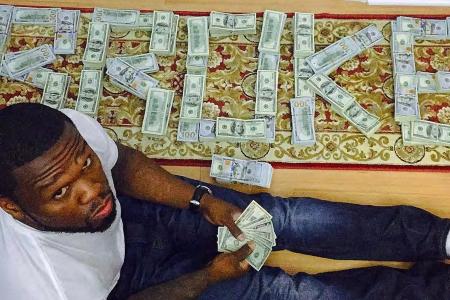Using social media to investigate the rich
Investigators use social media to keep tabs on hidden assets of the rich
The rapper 50 Cent was ordered by a Connecticut court last month to explain a photo on Instagram in which he posed with stacks of US$100 bills that spelled out "broke", months after filing for bankruptcy.
But the rapper claimed the money was fake.
In a separate divorce case, a corporate investigations firm uncovered multimillion-dollar hidden assets last year by monitoring the location of the children's social media posts.
The court had ordered the husband to give his wife US$30 million (S$40 million), but he claimed not to have such assets.
Mr Andrew Beckett, managing director of cybersecurity and investigations at investigations firm Kroll, told The Guardian: "We monitored social media, particularly for his children, who were in their 20s, and found a lot of posts from the same geo-tagged sites.
"We were able to go to the court with a list of assets that we conservatively estimated at US$60 million, which the court...seized until he settled the amount that had been ordered."
From selfies on super-yachts to posing with private jets, the young heirs of the uber-wealthy unwittingly reveal their parents' hidden assets, giving investigators proof to freeze or seize assets worth millions of dollars, the UK newspaper said.
This has become more significant after the publication of the Panama Papers, in which wealth of the super rich hidden in off-shore companies was revealed.
Leading cybersecurity firms said they are using evidence from social media for about 75 per cent of their litigation cases that include billion-dollar divorces and disputes between the mega rich.
Mr Oisín Fouere, managing director of K2 Intelligence in London, told The Guardian that social media was increasingly their "first port of call". Their opponent in one asset recovery case claimed to have no significant valuables - until investigators found a social media post by one of his children that revealed they were on his US$25-million yacht in the Bahamas.
Mr Daniel Hall, director of global judgment enforcement at Burford Capital, said most investigations involved using social media to map a target's family and business networks.
For example, they might use the metadata embedded in an Instagram post to identify their location, or use a Facebook "like" or tag to track down a proxy company.
Said Mr Hall: "You can start building up a profile of that individual: where they are; what their interests are; who are they regularly in touch with?"
Investigators often use location search tools such as Geofeedia, which enable them to throw a virtual "geo-fence" around a certain building or area and gather all of the social media posted from there in real time.
PANAMA PAPERS
Meanwhile, the law firm at the centre of explosive revelations about Panama-based offshore financial dealings had clients including drug barons and entities targeted by international sanctions, a report yesterday indicated, according to AFP.
Law firm Mossack Fonseca's papers were obtained from an anonymous source by German daily Sueddeutsche Zeitung and shared with more than 100 media groups by the International Consortium of Investigative Journalists.
In its latest batch of reports, Sueddeutsche said that Mossack Fonseca's client list included "drug traffickers from Mexico, Guatemala and eastern Europe" as well as people and companies hit by US and European sanctions.
"A likely financier of Hezbollah, people backing the Iranian and North Korean nuclear programmes and two alleged supporters of Zimbabwean President Robert Mugabe" can also be found in the firm's files, the newspaper said.
You can start building up a profile of that individual: where they are; what their interests are; who are they regularly in touch with?
- Mr Daniel Hall, director of global judgment enforcement at Burford Capital
Get The New Paper on your phone with the free TNP app. Download from the Apple App Store or Google Play Store now


